
 Podcasts
PodcastsCatch the latest PR news & updates with PRovoke Media's PR Podcasts. Lifting the lid on key industry stories & trends, join our listeners of PR podcasts today.
 Videos
VideosLatest video interviews and campaigns from PRovoke Media, previously known as the Holmes Report.
Long-form journalism that analyzes the issues, challenges and opportunities facing the business and practice of PR.
 Profiles & Interviews
Profiles & InterviewsExplore PR profiles and interviews with leaders from the marketing and PR worlds.
 Crisis Review
Crisis ReviewPR Crisis & Business Crisis review. PRovoke Media's annual analysis of the top reputation crises to rock the corporate sector. Read on here.
 Coronavirus
CoronavirusPRovoke Media's coverage of the Covid-19 crisis, focusing on corporate communication, public affairs & PR industry fallout.
 Trend Forecasts
Trend ForecastsPRovoke Media's PR Trends round up. PRovoke Media's annual forecast of PR trends and news that will impact the PR world in the year ahead...
 Social & Digital
Social & DigitalDedicated to exploring the new frontiers of PR as it dives deeper into social media, content and analytics.
 Technology
TechnologyOur coverage of key technology PR trends and challenges from around the world of digital communications.
 Consumer
ConsumerFrom brand marketing to conscious consumerism, coverage of key marketing and PR trends worldwide.
 Employee Engagement
Employee EngagementPRovoke Media's coverage, analysis and news around the rapidly-shifting area of employee engagement and internal communications.
 Sports Marketing
Sports Marketing Sports PR news, diversity & inclusion trends, views and analysis from PRovoke Media. Subscribe today for the very latest in the world of sports communications.
 Global PR Agency Rankings
Global PR Agency RankingsPRovoke Media's definitive global benchmark of global PR agency size and growth.
Enter PRovoke Media's 2024 Global 250 Agency Ranking and/or our Agencies of the Year competitions now.
 Agencies of the Year
Agencies of the YearPRovoke Media's annual selections for PR Agencies of the Year, across all of the world's major markets.
 Innovator 25
Innovator 25PRovoke Media profiles marcomms innovators from across North America, EMEA and Asia-Pac.
 Creativity in PR
Creativity in PRIn-depth annual research into the PR industry's efforts to raise creative standards.
 Asia-Pacific Communication Index
Asia-Pacific Communication IndexAPACD/Ruder Finn annual study of Asia-Pacific in-house communications professionals.
 SABRE Awards
SABRE AwardsThe world's biggest PR awards programme, dedicated to benchmarking the best PR work from across the globe.
 PRovokeSummit Global
PRovokeSummit GlobalThe biggest PR conference of the year, a high-level forum designed to address the critical issues that matter most.
 PRovoke Media Regional Series
PRovoke Media Regional SeriesA global network of conferences that explore the innovation and disruption that is redefining public relations.
 Agencies of the Year
Agencies of the YearUnrivalled insight into the world's best PR agencies, across specialist and geographic categories.
 Roundtables
RoundtablesOur Roundtables bring together in-house comms leaders with PR firms to examine the future of communications.
 Agency Playbook
Agency PlaybookThe PR industry’s most comprehensive listing of firms from every region and specialty
.jpg) All Jobs
All JobsFind the latest global PR and communications jobs from PRovoke Media. From internships to account executives or directors. See all our PR jobs here.
PRovoke Media's editorial series published in collaboration with partners.
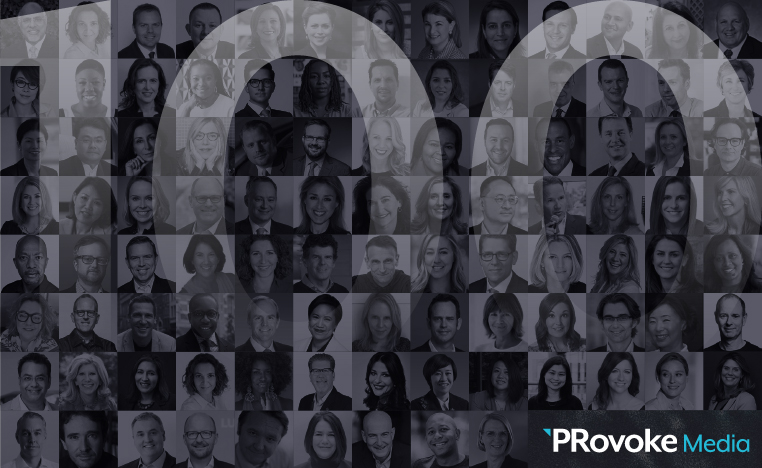
When we asked our respondents about their predictions for the future of the CCO and CMO roles within businesses, the responses were largely aligned. Most were convinced that there will be more integration and a blurring of the two roles, as in previous years:
“The lines between communications and marketing will continue to soften and the disciplines will merge.”
“Increasingly connected. Equality of influence.”
“Closer coordination if not total integration.”
“These roles are converging in many cases. There is a greater requirement and expectation for each.”
“Will continue to converge and eventually merge. It will happen before and faster in B2Bs.”
“CCO and CMO roles need to converge. There is no need for the different structures.”
“We will continue to work together very closely as it’s more important than ever for corporations to have unified messages across all channels.”
“Continued convergence of CMO and CCO roles, depending on the dynamics of the industry.”
“You can expect to see closer collaboration and the potential merger of the CCO and CMO roles as the lines begin to blur and the growing need of aligned narratives and marketing activities.”
“The two roles will be increasingly merged by more organizations. Collectively, they perform an ever more critical role.”
“CEOs struggle with too many direct reports so when the talent level makes it possible, you can sometimes combine these roles for simplicity. Both remain critical C-suite roles.”
There was also a majority view – with some very thoughtful responses – that chief marketing and chief communications officers would become more important in businesses, and also that both roles, or a newly-imagined combination of the two, would be more tightly connected with business success as well as the pressure on businesses to think beyond shareholder value alone, and manage their reputations even more carefully:
“They will grow in importance with the realization that reputation is a major driver of value and market capitalization.”
“I believe there is potential to redefine the role into a more powerful chief consumer officer role. A role that can connect all elements of your business that touch the consumer - removing silos and creating a more connected communications flow that puts consumers at the heart of everything you do.”
“These roles are more important than they have ever been. Businesses are under deep scrutiny as the world expects us to do good for the planet and for the people whilst keeping our eye on profits for the shareholders.”
“They will begin to merge, with CCOs taking on the conjoined roles, given the challenge for marketing leaders to execute what has become the real priority of CEOs: top-line revenue growth.”
“Reputation management is probably the largest single asset any company has (other than intellectual property/patent portfolios). Yet there are virtually no board members at Fortune 500 companies that have direct, hands-on experience managing reputations and crises. This is going to change over the next 10 years; I expect to see a lot of new board members at major companies who come not from the traditional board pipelines (management consulting, CEO, supply chain and CFO ranks) but from reputation management.”
“There will be ever more integration to drive reputation/NPS/brand strength and preference, as well as demand generation through combinations of paid, earned, owned channels around core thought leadership themes. However, the CCO’s role, whilst closely aligned to the CMO’s and oftentimes reporting to her/him functionally, will continue to have a direct working relationship with the CEO and executive committee, acting as advisor on all reputations matters and employee engagement as well as leadership communications.”
“Both the role of the CCO and the CMO will become even more valuable as we live and work in a real-time marketspace where constant communications is the cost of being in business.”
“In a fast-evolving business environment with multiple external stimuli impacting business performance, and with multiple disruptive modes of communications and platforms for data consumption by the stakeholders, the operative scope of a CCO has favourably amplified. Also with uncertain situations, fast changing demographic and socio-political trends, growth in activism and prevalence of fake news, the importance of reputation management is only set to grow.”
Others saw different kinds of developments for the roles within businesses, driven by how technology will influence the direction of business and communications:
“They will become ever broader and more important as speed of communication and scrutiny increase with technology.”
“Digitalization and commtech is the future. Marketing has pivoted in that direction much more quickly. It's an interesting dichotomy: we'll be using artificial or virtual means to create real relationships with key stakeholders. It’s a brave new world and the pandemic has accelerated efforts exponentially.”
And there was some soul-searching over whether the traditional CCO role in particular would grow or decrease in importance:
“CCO will continue to play a larger role in brand management and reputation management.”
“CCO will continue to grow in importance based on the need for brand trust and compassion.”
“The CCO role will continue to grow in organizational influence and significance. The CMO will evolve to be more focused on performance marketing.”
“I see no change in the foreseeable future. Communications will continue to be in the shadow of marketing at all but the largest, issue-prone companies and organizations. Social media has done nothing to increase the role of communicators with Instagram and YouTube becoming marketing tools more than communication tools.”
“The CCO role has all opportunities to become more influential but needs to take more learning from CMOs on tangible ROI. For most companies marketing budgets will be under pressure for years to come and PR/comms can benefit; the CCO can take a bigger role.”
This year, for the first time, we asked the Influence 100 to think about the future of the corporate communications function specifically. Mirroring responses to the question on what the future of the overall communications and marketing functions hold, our Influence 100 were unanimous that this particular aspect of the industry could only gain in strength, particularly given the extra – and extraordinary – pressures of the pandemic era for businesses of all sizes and sectors.
Again, our influencers' comments honed in on the tangible value to businesses – and their reputations – of a strong corporate communications team, including areas such as social purpose, trust, storytelling, technology and relations with all stakeholders.
“It will be a stronger function as we figure out how to show economic, social and reputational value to the enterprise.”
“It can become more influential, but it requires more data, tangible ROI on the basis of ‘outsmart not outspend’.”
“The function is becoming increasingly important as we manage how and when to respond to social issues, and the current environment. Proactively telling our story to colleagues and all of our relevant stakeholders is becoming more critical.”
“Trust in relation to all key stakeholders will continue to be essential for business success.”
“The relevance of the function will grow in those companies that want to be progressive and evolve at the pace of society. It will be more data driven and all outputs will be measured. It will operate in a similar way to political campaign 'war rooms'.”
“Similar to the rise of user-generated content and crowdsourced reviews in occupying a growing share of marketing resources, endorsements from legitimate, third-party, objective media, influencers and experts is becoming a major driver of purchase intent. This is the realm of messaging, reputation management, narrative and fundamentally communications, not traditional marketing or advertising. The communications function will continue to expand in prominence within organizations.”
“Corporate communications will become more and more central and strategic to protect/develop company reputation, because customers are really focused on proof of the commitments that have been taken.”
“Rising importance of corporate communications and convergence with adjacent functions, like government affairs and sustainability; more board interest in reputation and social purpose strategies; higher expectations for data-driven decisions and results.”
“Continued rise of importance particularly in the context of issues management and stakeholder engagement.”
“Given the current climate, organisations will need leaders with ability to be agile in shaping communications to an audience dealing with a post-Covid world.”
“I see corporate communications rising in importance. Companies are now expected to stand for something and use their voice to support that cause.”
“As consumer expectations increase and people look behind the brands that how you tell your story is crucial. And if you don't tell your own story someone will tell it for you.”
“Corporate communications is becoming ever more important as reputation and culture become key currencies in driving growth and performance.”
“As more news outlets fade away and remaining digital sites turn to sponsored content, corporate communications will see less of a role outside of issues management.”
“I believe earned owned and paid media will blend and corporate communicators will be reputation architects and general contractors, with more and more day-to-day work moving inside companies. Corporate communications leaders will have centers of excellence delivering against their business and reputational objectives.”
“Companies are going to be more closely scrutinized in the future and maintaining a license to operate will involve a more diverse set of expectations. It will be an even more important corporate communications imperative to keep the license current.”
“It will play an even more important role in helping stakeholders determine the truth.”
“I think corporate communications need to not only focus on the outside world because employees need equal or more attention. Our employees play a pivotal role in telling our stories and also in being ambassadors for brands.”
“Corporate comms will become increasingly data insight driven and digitally-focused to drive effectiveness of multi channel comms and reputation and crisis comms in real time.”
“Leaders today, and in the future, will stand out by standing up. As a result, there will be a greater need for corporate communications.”
“The golden gut is still very useful, and that will be supported by access to more and more data. Commttech is going to turn stakeholder engagement on its head.”
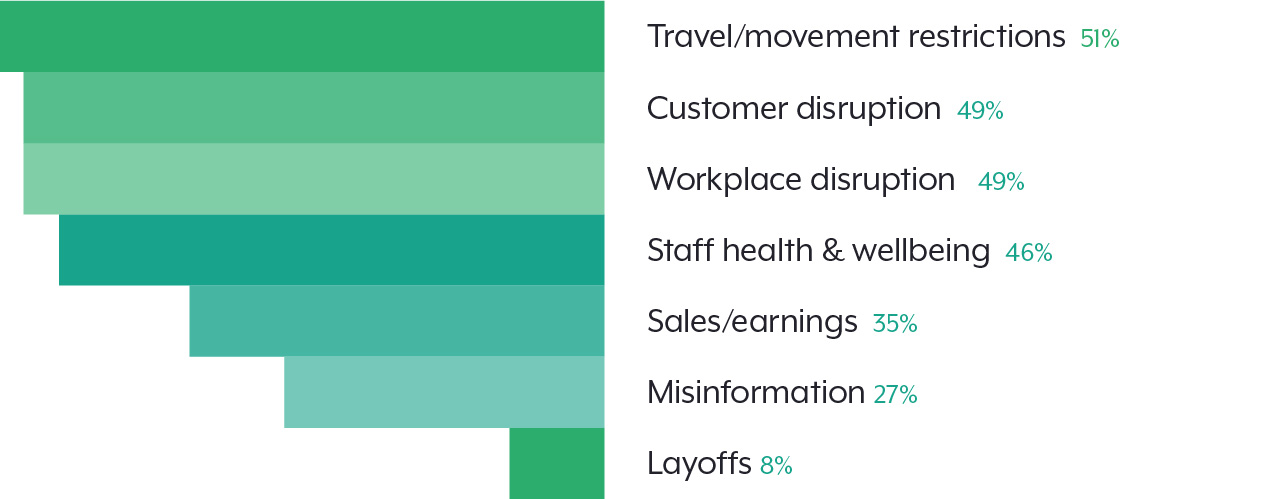
PRovoke Media has carried out several tranches of global research this year into the ongoing effects of Covid-19, and we also specifically asked the Influence 100 sample of senior in-house professionals what they felt were the biggest communications challenges faced by their organisations through this time.
The four top responses – all cited by around half of the respondents – were travel and movement restrictions, customer disruption, workplace disruption and staff health and wellbeing. Sales or earnings were also high up the list, with 35% saying the issue of whether their company was suffering in revenue terms was a preoccupying communications challenge. Misinformation was cited by 27%, while only 8% said that layoffs within their organisation were a communications challenge.


Diversity has become a spotlight theme for the industry this year, in the wake of the Black Lives Matter movement, and this has dramatically shifted what CCOs require of their PR agencies, and how committed they think the industry is to diversity. The number of our respondents who agree or strongly agree that their PR agencies must have an ethnically diverse team was up from 67% last year to 86% this year, although the number who agreed strongly was almost the same as last year at 34% compared to 33% in 2018 (but again up considerably only 12% in 2017). Only 7% were neutral, compared with 31% last year, but 7% of respondents still disagree or strongly disagree that their agencies must have ethically diverse teams.
There is much less conviction when it comes to whether our respondents think the communications industry is committed to recruiting, retaining and promoting people of color: 53% agreed or strongly agreed, compared with 47% last year and 37% in 2017. A further 22% were neutral, down from 42% last year, and while in 2018 only 11% disagreed or strongly disagreed that the industry was committed to recruiting, retaining and promoting people of color, this year there was perhaps a more honest and uncomfortable response, with 25% of our Influence 100 disagreeing or strongly disagreeing that the industry was truly committed to resolving issues of racial inequity.
There was an equally broadest spread of opinion about whether the industry is committed to recruiting, retaining and promoting people from diverse socio-economic backgrounds: just 13% strongly agree with this statement (similar to last year), with a further 20% agreeing (down from 28% last year), while 41% were neutral on this point and 25% disagree or strongly disagree, up from 20% last year.
When it comes to gender, 82% of CCOs agree their PR agencies must have a gender-balanced account team, up from 77% last year. But the number who disagreed that gender balance was a requirement of their agency teams was up notably, from 2% to 11%.
There was an increase in the number of our influencers who agree that the industry is committed to recruiting, retaining and promoting women from 78% last year to 84% this year. A further 13% took a neutral position, with only 2% saying they disagreed with this statement and no-one saying they strongly disagreed.
There’s a slightly less confident response to the questions of whether the industry is committed to recruiting, retaining and promoting LGBTQ people: 57% agreed or strongly agreed it was, up from 49% last year, but 31% were neutral and 12% disagreed with this statement, compared to 6% last year.

We asked our Influence 100 how their CEO evaluates PR and communications, and reputation benchmarking came out even further ahead of the other options than previously: 89% compared with 86% last year and up from 63% in 2017. While sales and lead generation garnered zero responses in 2017, this year it was cited as one of the ways the C-suite measures the success of comms by 9% of respondents, although this was down from 14% last year.
Tactical measurement of PR, including impressions, reach and social engagement was used by far more respondents than last year – 51%, compared to 31% last year but consistent with 52% in 2018. Of the 24% who said they used other means, the responses varied from “business success tied to key initiatives”, “share of voice vs competitors” and “impact on the regulatory environment” to the rather less robust “board reaction”, “employee sentiment” and “qualitative and anecdotal assessment and evaluation”.
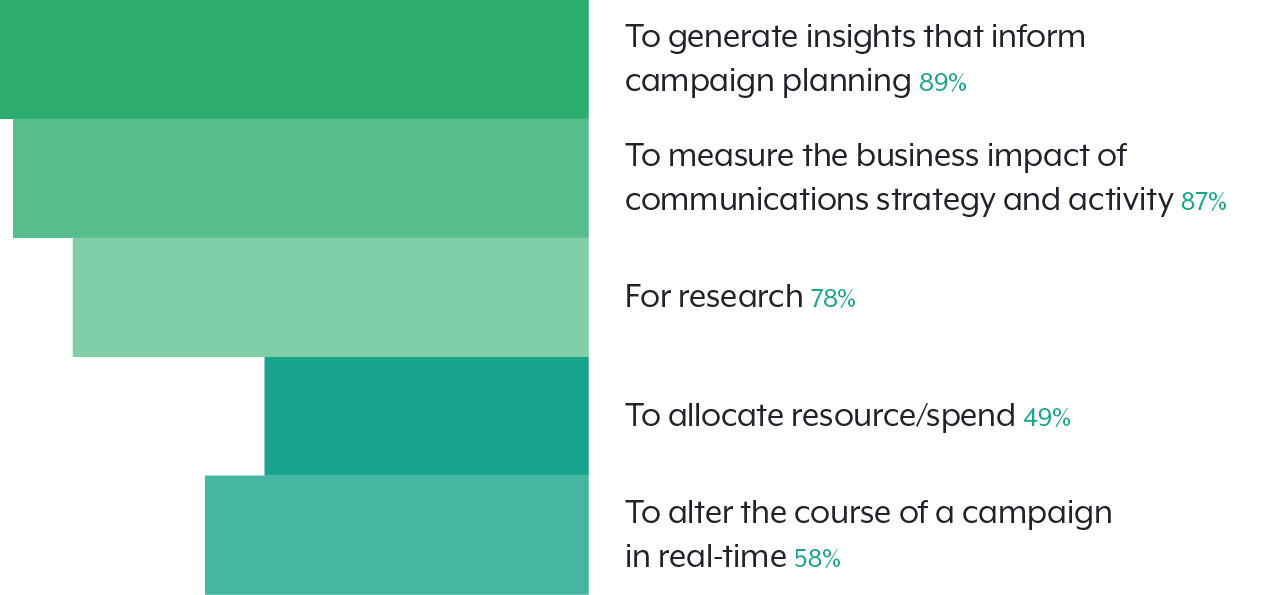
Our survey shows a dip in the trend of recent years for data and analytics increasingly being used in multiple ways within organisations. There was a drop in the number of those who said they use data to allocate resource and spend: 49%, down from 65% last year but still up from 43% in 2018 and 30% in 2017. There was, however, another big increase in the number who said they use data and analytics for research purposes: up to 78% from 55% in 2018 and 70% in 2019.
Nearly 60% – up from around half last year – use data and analytics to tweak campaigns in real time. By far the strongest responses, however, were again for data and analytics being used to generate insights that inform campaign planning (89% compared to 78% last year), and to measure the business impact of communications strategy and activity (87%, up from 84% last year).
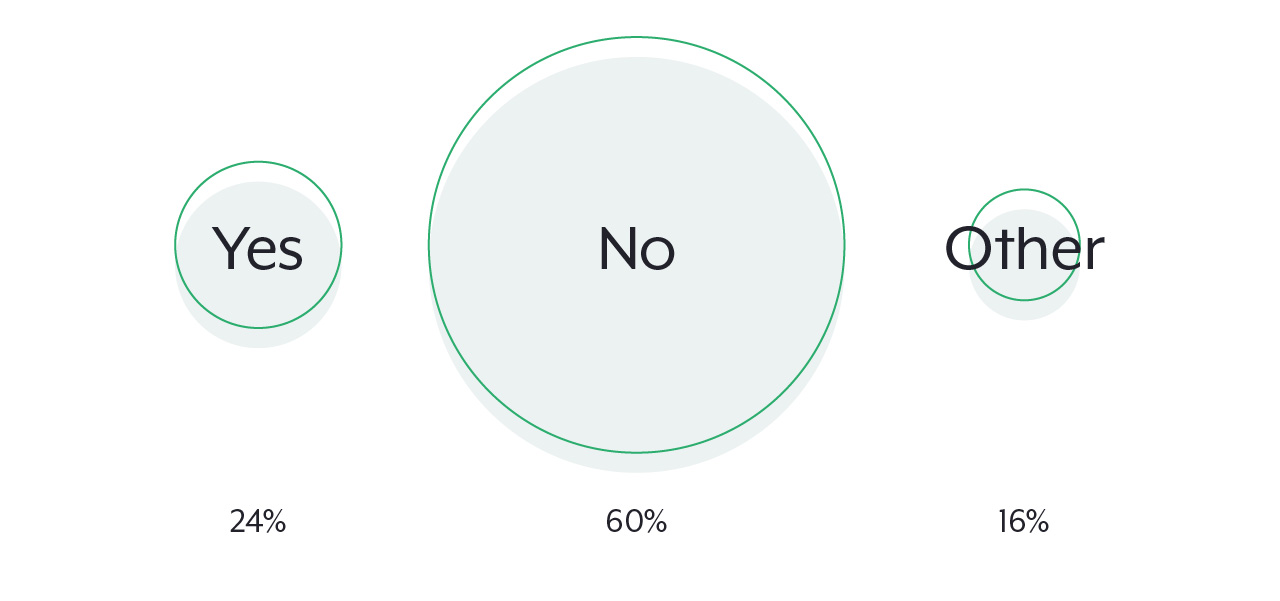
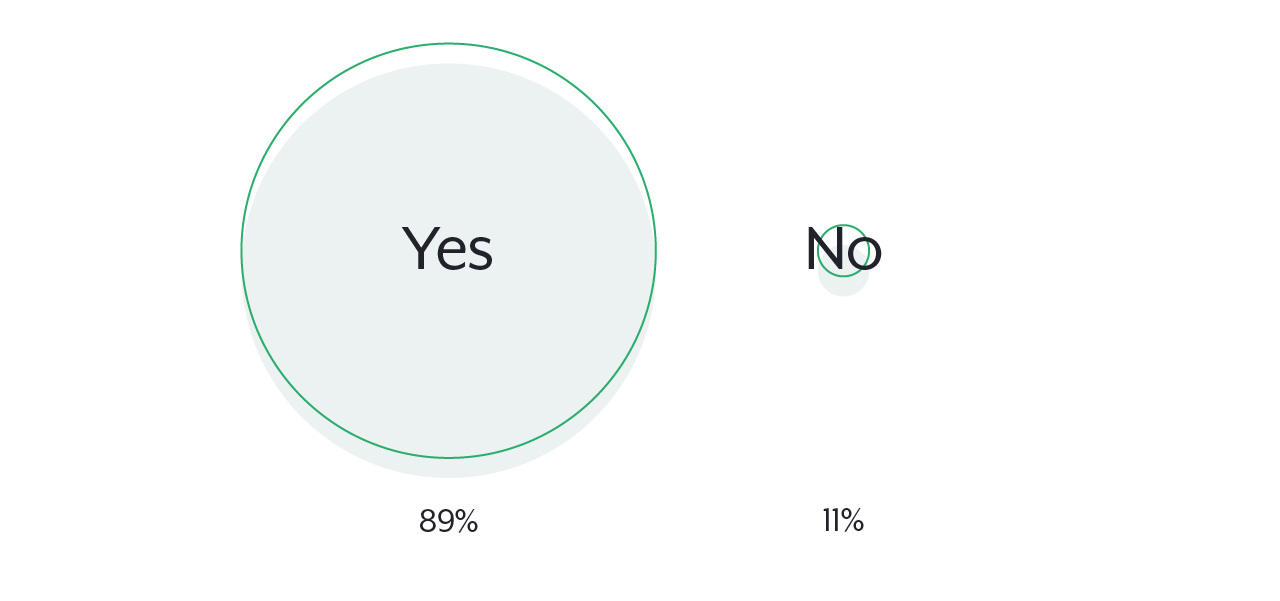 We again asked CMOs and CCOs whether PR is used for demand generation within their organisation. In other words, is there a direct link made between comms and business results? Despite a great deal of effort within the industry in recent years on showing that PR can do just that, only a quarter of respondents – 24% – said yes, down from 31% last year, while 60% said no, up from 50% last year. There were other response from 16% of our cohort, including: “overall no but in certain parts of the org (ads, cloud) there is more dependence on comms”; “as it relates to reputation and influence, and part of integrated team on product”; and “comms is not exclusively responsible for demand gen but it certainly plays a key role.”
We again asked CMOs and CCOs whether PR is used for demand generation within their organisation. In other words, is there a direct link made between comms and business results? Despite a great deal of effort within the industry in recent years on showing that PR can do just that, only a quarter of respondents – 24% – said yes, down from 31% last year, while 60% said no, up from 50% last year. There were other response from 16% of our cohort, including: “overall no but in certain parts of the org (ads, cloud) there is more dependence on comms”; “as it relates to reputation and influence, and part of integrated team on product”; and “comms is not exclusively responsible for demand gen but it certainly plays a key role.”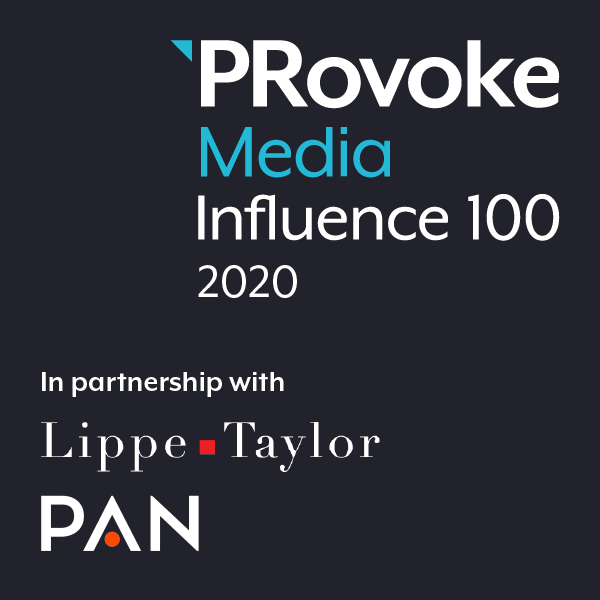




Intelligence and insight from across the PR world.
About PRovoke Media Contact Us Privacy & Cookie PolicyWe feel that the views of the reader are as important as the views of the writer. Please contact us at [email protected]
Signup For Our Newsletter Media Kits/Editorial Calendar Jobs Postings A-Z News Sitemap© Holmes Report LLC 2024